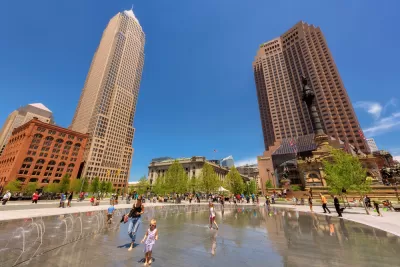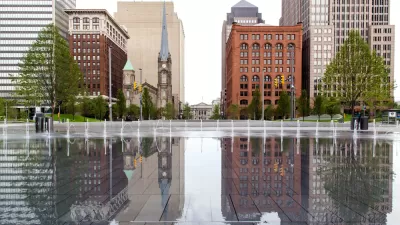Whether or not it was the right decision, the process leading to the decision to prohibit buses from Cleveland's renovated Public Square raises questions in Cleveland.

A Crain's Cleveland Business editorial questions the political and planning process that preceded the recent decision by the city of Cleveland to reroute buses around the Public Square.
The city of Cleveland may have chosen the right direction for the future of bus traffic around Public Square, but its process for getting there was chaotic, and it leaves us with less confidence about the Jackson administration's planning abilities on major endeavors.
Though the editorial provides a positive review of the Public Square since it reopened with a design by James Corner Field Operations, the editorial questions the way the renovation process changed its plan to allow buses into the Public Square after the renovation.
Buses had been re-routed around the square through construction and then after it opened, though they were supposed to start running through it again in August. That never happened. As much as people enjoy the bus-free center of Public Square, it's unfortunate that there wasn't a test for a couple months of whether the space could indeed have accommodated buses safely.
The editorial notes some very serious consequences to the decision, both to transit service and to the terms of an agreement between the Federal Transit Authority and the RTA to create a downtown transit zone in connection with the HealthLine.
FULL STORY: Crain's editorial: Change in direction

Alabama: Trump Terminates Settlements for Black Communities Harmed By Raw Sewage
Trump deemed the landmark civil rights agreement “illegal DEI and environmental justice policy.”

Study: Maui’s Plan to Convert Vacation Rentals to Long-Term Housing Could Cause Nearly $1 Billion Economic Loss
The plan would reduce visitor accommodation by 25% resulting in 1,900 jobs lost.

Planetizen Federal Action Tracker
A weekly monitor of how Trump’s orders and actions are impacting planners and planning in America.

Waymo Gets Permission to Map SF’s Market Street
If allowed to operate on the traffic-restricted street, Waymo’s autonomous taxis would have a leg up over ride-hailing competitors — and counter the city’s efforts to grow bike and pedestrian on the thoroughfare.

Parklet Symposium Highlights the Success of Shared Spaces
Parklets got a boost during the Covid-19 pandemic, when the concept was translated to outdoor dining programs that offered restaurants a lifeline during the shutdown.

Federal Homelessness Agency Places Entire Staff on Leave
The U.S. Interagency Council on Homelessness is the only federal agency dedicated to preventing and ending homelessness.
Urban Design for Planners 1: Software Tools
This six-course series explores essential urban design concepts using open source software and equips planners with the tools they need to participate fully in the urban design process.
Planning for Universal Design
Learn the tools for implementing Universal Design in planning regulations.
Caltrans
Smith Gee Studio
Institute for Housing and Urban Development Studies (IHS)
City of Grandview
Harvard GSD Executive Education
Toledo-Lucas County Plan Commissions
Salt Lake City
NYU Wagner Graduate School of Public Service



























